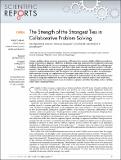The Strength of the Strongest Ties in Collaborative Problem Solving
Author(s)
de Montjoye, Yves-Alexandre; Stopczynski, Arkadiusz; Shmueli, Erez; Lehmann, Sune; Pentland, Alex Paul
Downloadde Montjoye-2014-The strength of the.pdf (653.4Kb)
PUBLISHER_CC
Publisher with Creative Commons License
Creative Commons Attribution
Terms of use
Metadata
Show full item recordAbstract
Complex problem solving in science, engineering, and business has become a highly collaborative endeavor. Teams of scientists or engineers collaborate on projects using their social networks to gather new ideas and feedback. Here we bridge the literature on team performance and information networks by studying teams' problem solving abilities as a function of both their within-team networks and their members' extended networks. We show that, while an assigned team's performance is strongly correlated with its networks of expressive and instrumental ties, only the strongest ties in both networks have an effect on performance. Both networks of strong ties explain more of the variance than other factors, such as measured or self-evaluated technical competencies, or the personalities of the team members. In fact, the inclusion of the network of strong ties renders these factors non-significant in the statistical analysis. Our results have consequences for the organization of teams of scientists, engineers, and other knowledge workers tackling today's most complex problems.
Date issued
2014-06Department
Massachusetts Institute of Technology. Media Laboratory; Program in Media Arts and Sciences (Massachusetts Institute of Technology)Journal
Scientific Reports
Publisher
Nature Publishing Group
Citation
De Montjoye, Yves-Alexandre, Arkadiusz Stopczynski, Erez Shmueli, Alex Pentland, and Sune Lehmann. “The Strength of the Strongest Ties in Collaborative Problem Solving.” Sci. Rep. 4 (June 20, 2014).
Version: Final published version
ISSN
2045-2322